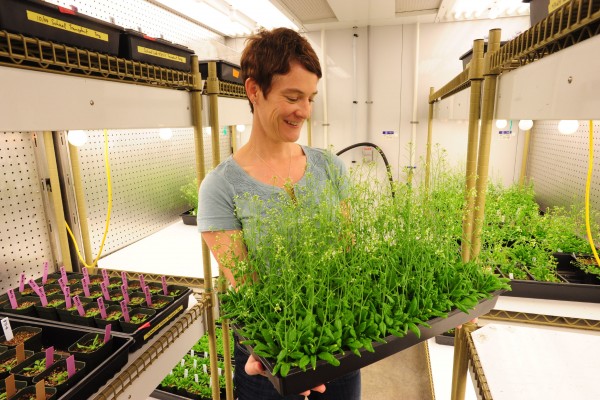I-CARES career development awards go to Fortner, Williams
Two engineering faculty have been chosen for I-CARES career development awards: John Fortner, PhD, and Brent Williams, PhD, both assistant professors in the Department of Energy, Environmental & Chemical Engineering. I-CARES, the International Center for Advanced Renewable Energy and Sustainability, was established in 2007 to encourage interdisciplinary research on problems in the fields of energy, environment and sustainability.
WUSTL receives Gates Foundation Grand Challenges Explorations funding
Yinjie Tang, PhD, the Francis Ahmann Career Development Assistant Professor in energy, environmental & chemical science, has won funding from the Bill & Melinda Gates Foundation to pursue an innovative global health research project, titled “Using fecal sludge for butanol fermentation.”
Axelbaum installed as Stifel & Quinette Jens Professor
Richard L. Axelbaum, PhD, professor of energy, environmental & chemical engineering in the School of Engineering & Applied Science, is the new Stifel & Quinette Jens Professor in Environmental Engineering Science. Chancellor Mark S. Wrighton installed him in a ceremony Oct. 31 in Brauer Hall.
New evidence for the earliest modern humans in Europe
The timing, process and archaeology of the peopling of Europe by early modern humans have been actively debated for more than a century. Reassessment of the anatomy and dating of a fragmentary upper jaw with three teeth from Kent’s Cavern in southern England has shed new light on these issues.
Plants feel the force
At the bottom of plants’ ability to sense touch, gravity or the proximity of a nearby trellis are mechanosensitive channels, pores through the cells’ plasma membrane that are opened and closed by the deformation of the membrane. Elizabeth Haswell, PhD, a biologist at Washington University in St. Louis, is studying the roles these channels play in Arabidopsis plants by growing mutant plants that lack one or more of the 10 possible channel proteins in this species.
National science standards to the rescue
WUSTL geophysicist Michael Wysession is leading a team of scholars who are helping the nation’s top science agencies develop national standards for K-12 science education. The core disciplines covered by the new standards include engineering and Earth and planetary sciences, which have never before been a standard part of the K-12 curriculum. Wysession currently co-leads the team writing the Earth and planetary standards, and a key focus of his mission is ensuring that students gain a solid grasp of the Anthropocene, loosely defined as the period in Earth’s history during which human activities have had a significant impact on Earth systems.
Biswas installed as the Lucy & Stanley Lopata Professor
Pratim Biswas, PhD, is the new Lucy & Stanley Lopata Professor at Washington University in St. Louis. Chancellor Mark S. Wrighton installed him in a ceremony Monday, Oct. 10, in Whitaker Hall. Biswas, chair of the Department of Energy, Environmental & Chemical Engineering (EECE), is one of the world’s leading experts in aerosol science.
Jerome Cox, Jonathan Turner to receive 2011 Chancellor’s Award for Innovation and Entrepreneurship
Jerome R. Cox Jr., ScD, senior professor, and Jonathan S. Turner, PhD, the Barbara J. and Jerome R. Cox, Jr. Professor, both in the Department of Computer Science & Engineering in the School of Engineering & Applied Science, will receive the 2011 Chancellor’s Award for Innovation and Entrepreneurship during the Faculty Achievement Awards ceremony at 6 p.m. Dec. 3 in Simon Hall Auditorium.
$ 2.2 million Department of Energy grant to build a fuel-producing bacterium
The Department of Energy has funded a three-university collaboration led by Washington University in St. Louis to approach the problem of algal fuels systematically.In a two-step project, the team will first attempt a comprehensive understanding of the metabolic machinery of selected cyanobacterial strains and then implement that understanding by assembling a novel bacterium with the machinery needed to produce fuel molecules. They will be bringing to bear on the problem of algal fuels the most sophisticated approaches contemporary biology now has to offer: systems biology and synthetic biology.
‘Non-invasive’ cultivar? Buyer beware
Cultivars of popular ornamental woody plants that are being sold in the United States as non-invasive are probably anything but, according to an analysis by a Washington University in St. Louis botanical researcher published in the October issue of BioScience.
Older Stories

